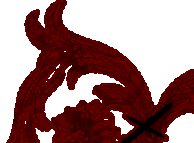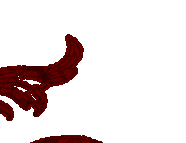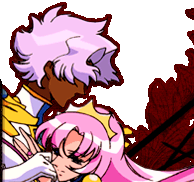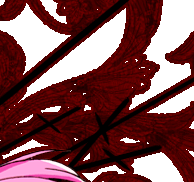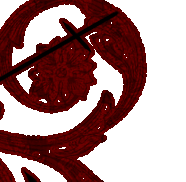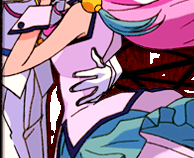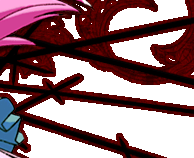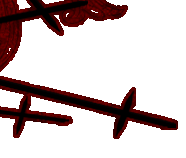
Cosmopolitan Designs in Salman Rushdie's 'The Enchantress of Florence'
and Hermann Hesse's 'Demian'
(Including an excursus on Kunihiko Ikuhara's anime-series 'Revolutionary Girl Utena')
This analysis
was donated by Meike Nederveld.  4 Excursus – Revolutionary Girl Utena and The Shell of the World
If it cannot break the shell of the world,
the chick will die without ever being born.
We are the chick, the egg is the World.
If we cannot break the shell of the world,
we will die, without ever being born.
Destroy the shell of the world!
For world revolution!
(Shoujo Kakumei Utena)
Wer geboren werden will, muß eine Welt zerstören.
Der Vogel Kämpft sich aus dem Ei.
Der Vogel fliegt zu Gott.
Der Gott heißt Abraxas.
Das Ei ist die Welt.
(Demian, P.107)
Kunihiko Ikuhara's multimedia Bildungsroman Shôjo Kakumei Utena was
(almost) simultaneously released as a manga-comic12 (1996) and an animated
TV-series (anime) (1997). In 1999 a theatrical movie followed13. There is also a
video game and a musical14. With the exception of the videogame, which tells a
standalone story set between two episodes of the series, all its iterations tell
roughly the same story revolving around the same key characters, but with
different priorities. Common themes of all are coming-of-age, sexuality and
gender, "forbidden" love, abuse, friendship, magic, the devil, roses and cars.
Ikuhara was creatively involved in all these works, but as a director he was most
involved in the series and the movie, the former of which shall be the one most
referenced in this paper, since of the two the series came first. An occasional
reference to the movie might be made, however, to highlight certain points.
 4.1 Outline of Plot and Characters
Shôjo Kakumei Utena is set at and around the campus of Ôtori Academy, a multi-
branch boarding school including every level of education, from kindergarten to
university. Against this background, an allegory of youth itself, the heroine, 14
year old Utena Tenjô, has asserted the role of the slightly awkward tomboy,
successfully hiding her own insecurities behind a mask of righteous strength and
nobility. Utena wears a stylized boy's uniform and refers to herself in the
masculine form "boku", mimicking the memory of a fairytale prince who
comforted her when, as a little girl, she had just lost her parents. In her
righteousness, she soon comes into conflict with members of the student council,
in truth a dueling fraternity with occultist rituals reminiscent of freemasonry, and
in a duel, unwittingly, wins the coucil's "prize": Anshi Himemiya15, a girl of
(apparently) Indian origin, dubbed the "Rose Bride". Anshi is now Utena's
"fiancée", and can summon a magical sword from her bosom, with which Utena
must fight the members of the student council, who in turn try to win Anshi back,
because the Rose Bride is said to be the key to the "power of world revolution".
The series spans four major story arcs, three of which cover the duels for the
possession of the Rose Bride.
In the first arc, the members of the student council are introduced and
subsequently challenge Utena: Saionji, the tragically comic samurai-spirit who is
madly in love with Anshi, but regularly abuses her, Miki, the shy genius who
longs to relive the early childhood closeness with his twin sister by being close to
Ashi, Juri, the captain of the fencing club who hates Anshi and the very idea of
the mystical, because she gave up on seing her own lesbian desires for another
girl (miraculously) fulfilled, Tôga, the council president who knows more about
Utena's past than he lets on, the only one to actually beat her in a duel, and
Nanami, Tôga's little sister, whose incestuous desire for her brother arouses her
jealousy of Anshi, the Object of the dueling "game". This way, she also becomes
the protagonist of a few comic relief episodes, in which she tries to sabotage
Anshi, but constantly has her plans foiled by strange happenings involving body-
switching curry, wild elephants or being turned into a cow.
The second arc – "Black Rose" – introduces three more players: Mikage and
Mamiya16, figures, as it turns out, of a past long gone, who share an uncanny
resemblance with Utena and Anshi, though gender-inverted, and, most
importantly, Akio Ôtori, the school's principal and Anshi's older brother, who
turns out to be the one behind the dueling game and all the powers of the
mystical surrounding it, and whom Utena, oblivious to this, starts to look up to as
an advisor. The arc deals with the "shadows"17 of the charismatic main cast, the
tragic extras to their stories: Akio's fiancee, Tôga's admirer, Nanami's grade
school henchman, Juri's crush, Saionji's replacement for Anshi – and Utena's best
friend. Each of them have their brief moment in the spotlight, before they, too,
are defeated by Utena, but in the end, by a narrative twist, the whole arc is
declared nonexistent, and the action continues where it left off after the first arc.
The third arc explores the conflicts raised in the first two arcs in more depth,
while Utena and Anthy move in with Akio, who resides at the principal's tower, a
gigantic phallic object overlooking the campus. The two girls now sleep in
adjoining beds, and talk each evening, the subject and manner of the
conversation slowly turning more and more eerie, as Utena remains impervious
to suggestions that Anshi may be hiding a horrible secret. The secret is revealed
when Nanami stays at the tower and discovers Anshi and Akio's incestuous
relationship. Utena, still unaware of this, and by now infatuated with the
principal, accompanies him on an outing. They end up at a hotel, where he
seduces18 her.
The last arc is permeated with flashbacks, explaining what happened when Utena lost her parents, and how Akio and Anshi came to be what they are: Akio was
once the prince "Dios", the champion of the people, but when he lay suffering
from a wound, his sister seduced him to make him "disappear", so he could not
be made to fight. When she confronts the masses, saying that he now belongs to
her, she is called out for a witch and stabbed by a thousand swords. Her brother,
no longer "Dios" is now "Akio" meaning the "morning star", latin: "lucifer", and
Anshi, the witch, is the source of his power. It turns out that Utenas encounter
with the prince was actually an encounter with Anshi, the sight of whom, impaled
by countless swords but immortal, incites her sympathy, and she vows to be the
prince who saves her – the prince her brother cannot be.
During the final showdown between the three, however, Anshi is unable to put
her trust in Utena, runs her through with the prince's sword, and finally
volunteers to face the thousand disembodied swords again, to enable her brother
to seize the power of revolution. Her ritualized sacrifice is a symbol of how the
power of patriarchy stems from the penetrability of the female body. He fails to
open the symbolic gateway, however, but Utena, still clinging to her ideals,
manages to pry open the doors of revolution, seeking still to save Anshi from the
swords. Behind the door, she finds Anshi in a coffin, where her true self had been
locked all this time, and they touch for a brief instant, before Anshi and her coffin
fall into the abyss and the thousand swords, having crushed Akio, then smash
into Utena. This final image is rather disturbing as it can be read as symbolizing
corrective rape, the swords turning on the lesbian woman who poses a threat to
patriarchy as she removes the female body its power is built on, but on the other
hand, the destruction of the heroine Utena is part of the process of destroying the
"shell of the world", so the adult Utena can be born in the outside world.19
The aftermath shows life at Ôtori Academy going on as before, with only slight
alterations. Akio plans to set up a new dueling game, but Anshi, having discarded
her school uniform, leaves him and the school to go search for Utena, who she is
convinced now lives in the outside world.
 4.2 Shared Themes
Hesse's Demian is usually cited as the literary model for Shôjo kakumei Utena20
Like Sinclair, Utena first encounters the supernatural when she is very young,
and the encounter leaves a mark. While in Demian this mark is abstract and
invisible, Utena is given a tangible sign: a signet ring depicting a rose. The rose
functions as a replacement for Demian's sparrow hawk21, as a symbol of that first
encounter, a guide towards reunion, as well as a reminder of the greater context
of the characters within a community. In both cases, the encounter in early
childhood is, however, laden with the taboo of a sexually charged abuse –
Sinclair feels violated by Kromer (who also poses a threat to his sister's sexual
integrity) and at the same time feels a masochistic delight when imagining
Demian in Kromer's place, while Utena witnesses Anshi writhing in pain from a
multitude of swords driven through her body – and both rationalize their
experience through the heterosexual (though the objects in both cases are rather
androgynous) desire for an idea personified. It is only once they have moved
beyond this desire, that their homoerotic attraction resurfaces, albeit amidst the
catastrophe.
A very interesting feature of Utena in relation to both Demian and Enchantress is
the localization of the origin of magic in India, as it draws precisely from the
point of thematic interface between Hesse and Rushdie. In Enchantress, europe
and the middle east are the realm of potato- and polenta-magic, and of
necromancy, while the true magic, bordering on the divine, either comes from, or
happens in, India. In Utena, Anshi also wields petty magic to thwart Nanamis
Plots – such as curry magic or controlling elephants. This sort of magic is
stereotypically indian, while Akio's petty magic – using his planetarium's
projector to create illusions and seducing women and men with his sports car – is
technical trickery, but the real divine magic that she and Akio control seems far
more universal, just like the Magic of Qara Köz and Akbar.
The most striking similarity between Utena and Rushdie's Enchantress, however,
is the way both deal with taboo and society. Rushdie italicizes the word "witch",
which Qara Köz identifies as „the word that made it unsafe for her to remain“
(Rushdie 296). "Witch" is also stressed again and again as Anshi's "true identity"
within the embedded narrative of a stage play that tells the stylized story of Anshi
and Akio's origins. It is also the word cried by the mob attacking Anshi, and
whispered by the thousand swords. The other word, mirroring „witch“, similarly
introduced and italicized, is "incest", "a word so powerful that it could severely
damage the esteem in which the emperor was held, and maybe even rock his
throne" (Rushdie 325). The taboo of incest, as Akbar suggests, is one of the
constituting features of human society (Cf. Rushdie 338), which also holds true
for the society depicted in Utena. While Nanami flirts with the idea of a romance
with her brother, actually seing what it is she naively desires, looking at the face
of the taboo played out, traumatizes her. Still, in Utena, as well as Enchantress,
both the witch and the unholy communion of incest are not presented as purely
evil, but ambiguous. The witch is at once the enchantress, and through incest,
magic is born. Niccoló Vespucci, the androgynous enchanter, is the product of
incest, and only the incestuous love of Akbar for Qara Köz, whose ambassador
he is, can realize the middle passage her magic has forged, and make the world
round – that is to say, enable it to revolve, revolutionize it.
 4.3 Queerness as a Version of Cosmopolitanism
Most of the central Characters in Utena have a certain queerness to them. Utena
crossdresses, and her sapphic tension with Anshi is a central motive of the series.
Saionji and Tôga, the Kendo sparring-partners, are childhood friends, but their
relationship is charged with homoerotic imagery22. Miki and his twin sister are
mirror images, reflecting the male within the female and vice versa. Juri is a
lesbian. Even Anshi, usually femininely demure in the role of the rose bride, is at
one point transformed into the boy Mamiya to enable Akio to manipulate
Mikage, who is bisexual, and fixated on Mamiya. Only Nanami, who drifts in
and out of the student council, never really becoming a part of it, is almost
painfully in line with gender conventions23, even calling out the others for their
"abnormal" behavior. Lastly, Akio, the rich, sportscar-driving playboy antagonist,
is the epitome of male sexual power, that only cares for the hierarchy of
penetration, less so for the gender of the penetrated.
In the earlier chapters I hope to have established Rushdie and Hesse's
cosmopolitanism as requiring a noble predisposition. The citizens of the world
are drawn, by curiosity, by trauma, by love, out of their native contexts into a
world that is strange to them, or they are confronted with the strange as it enters
their world, but they are already significant when their call arrives. In episode 20,
when Utena wonders why her plain friend Wakaba suddenly seems illuminated
by some inner light, Akio puts it this way:
Akio: There are special people in the world.
Akio: And they are always noticed.
Akio: For example, like yourself...
[...]
Akio: That is the special quality that you carry from birth.
[...]
Akio: Most people are but a single person amongst multitudes.
Akio: However, given the slightest chance, they will shine with a light that
they have never had before.
It is clear that the "special people" are the main cast. They are separated from the
rest of the student body by both the way they dress, and the colors associated
with them. Their uniforms are different, and mirror their hair colors - primary
colors and their complements, plus Utena's "girl"-pink. They all excel at
something, are rich and/or beautiful, and as a result of this are revered by the
other students. They also form the „true“ government of the school, controlling
students and teachers alike, and serve as tutors and advisors. This is the very
image the stoics proposed as the ideal citizen. The androgyny of their dress,
especially in the case of the women, Juri and Utena, can be read as the negative
claim of the cynics: I am as a prince among men, thus I do not have to adhere to
the standards of gender. Lastly, the idea of human rights advocated on the
background of an impartiality towards, in this case, social conventions of gender,
aligns with 18th century ideas of cosmopolitanism. Utena uses her special status
to defend other people, or to act as a go-between, never judging. However, her
impartiality is an illusion insofar as others will still stereotype her, namely Akio
and Tôga, who both attempt to put her in a dress, and make her conform to the
role she is born into.
Anshi, in this scheme, is the passively displaced. She does not choose queerness,
but being a victim of sexual abuse, she is already outside of the normative system
of sexuality, and is additionally forced to be "engaged" to whoever wins her, no
matter the gender. The magic she employs, thus, is a strategy for survival. She
grants her powers to the victor to avoid being displaced again, but switches
sides24 once he is defeated, just as Qara Köz does.
Finally, the very idea of world revolution is born of cosmopolitan thought. For
Demian, Hesse draws strongly from anarchist and trotzkist thought, and the
revolution to come is "der Wille der Menschheit [...], den unser Europa eine
Zeitlang mit seinem Jahrmarkt von Technik und Wissenschaft überschrien hat"
(Hesse 160), a global happening which will impact all humankind. In Utena, set
in a limited subspace of the world, a microcosm, this revolution must be limited
as well, so where Demian's revolution turns out to be the first world war, Utena presents the viewer with a bisexual, fatal love triangle, the question whether or
not to wear a dress, and the removal of the pillars of patriarchy.
Go back to Index - Next Page
10 One could even argue further that Akbar, who is introduced slaying another ruler, a "holier-
than-thou type of youth" (P. 35) and whose last chapter begins "He was Adam's heir, not
Muhammad's", is, in this way, even more explicitly likened to the figure of Cain.
11 Citing page 139 of Jung, C.G. Synchronicity, an Acausal Connecting Principle. London:
Routledge, 1972.
 |

